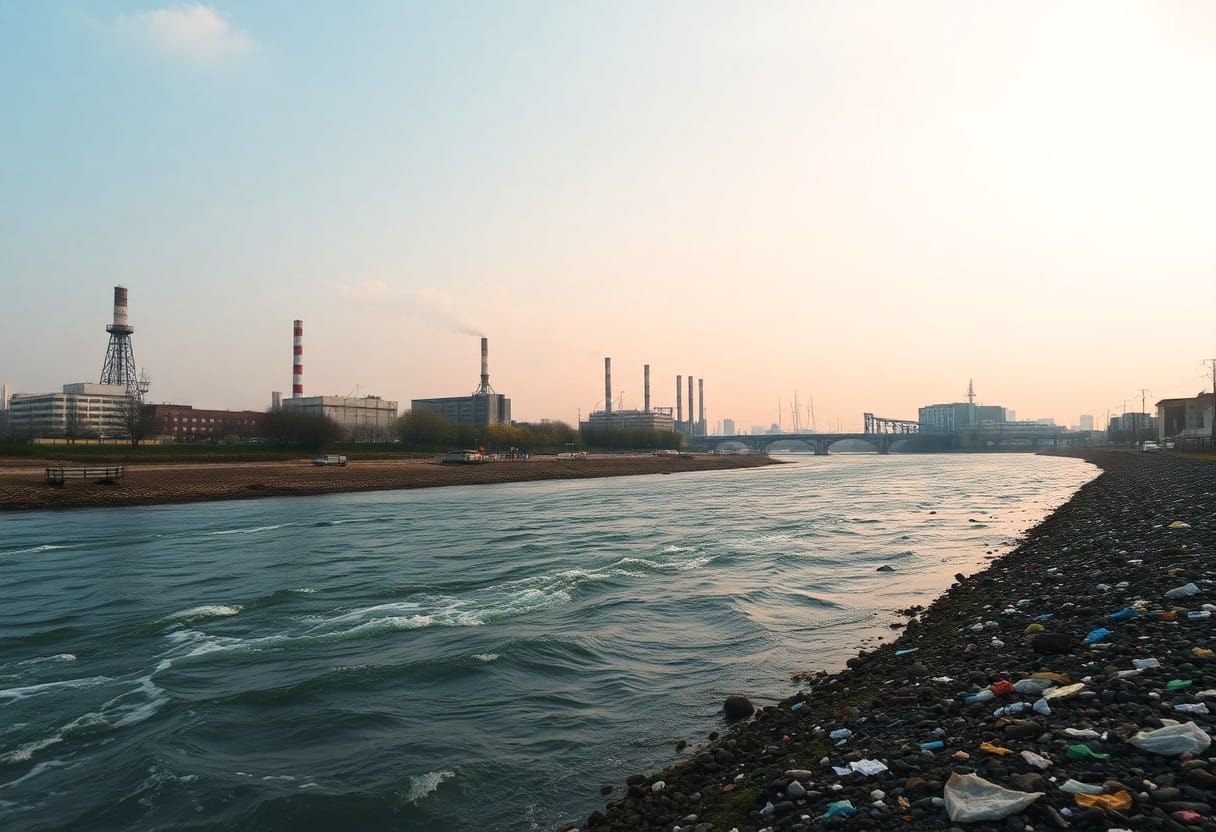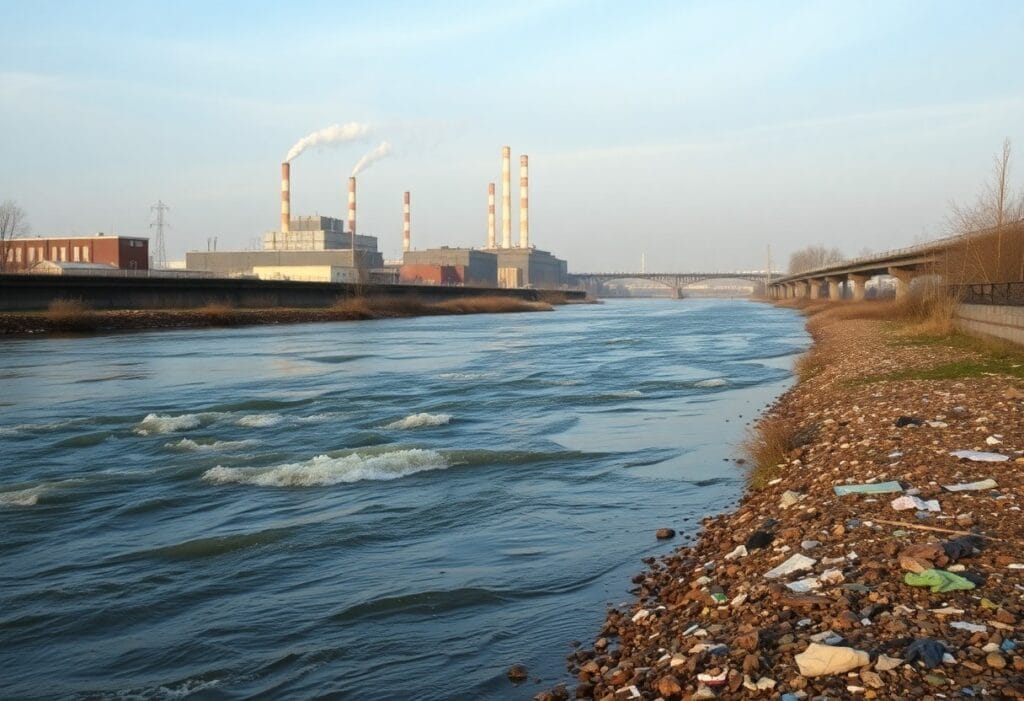Most people are unaware of how corporate interests can overshadow environmental safety, particularly in Fayetteville with Chemours. You may be surprised to learn that this chemical company has been allowed to operate with minimal oversight, contributing to pollution that poses risks to both health and the ecosystem. This blog post will explore the factors that led to this negligence, revealing the complexities of regulation, community impact, and the ongoing fight for accountability in your region.
The Role of Chemours in Pollution
Overview of Operations
A significant contributor to environmental concerns in Fayetteville is Chemours, a chemical company that operates a manufacturing facility in the area. The facility produces a variety of products, including fluoroproducts that are used in non-stick coatings and other applications. This operation has a substantial footprint, requiring large quantities of raw materials and generating waste that can impact air and water quality. You might be surprised to learn that, even with extensive regulations in place, the potential for environmental limitations to be exceeded still exists, often due to the complexity of industrial processes.
Key Pollutants Identified
Behind Chemours’ operations lies the release of several key pollutants that have raised alarms among environmental advocates and local residents alike. Chemours has been found to emit per- and polyfluoroalkyl substances (PFAS), commonly known as “forever chemicals,” which are notorious for their persistence in the environment and human body. These chemicals can contaminate groundwater supplies, posing health risks such as cancer, liver damage, and developmental issues. As you investigate further, you’ll likely discover that the impact of these pollutants extends far beyond immediate emissions.
Consequently, addressing the concerns associated with Chemours’ pollutants has become a key focus for both the local community and regulatory agencies. The negative implications of PFAS on environmental health are alarming; they not only linger in ecosystems but also enter the food chain, ultimately affecting your lifestyle and wellbeing. The calls for greater oversight on emissions and management practices are becoming louder, as residents demand accountability to ensure that their air, soil, and water remain safe for future generations.
Regulatory Oversight
There’s a significant concern regarding the regulatory oversight of Chemours’ operations in Fayetteville, where the pollution went largely unchecked. The responsibility for monitoring environmental compliance often falls to both state and federal agencies, but their ability to enforce regulations effectively has been called into question. For instance, a report from in the united states district court highlights a lack of sufficient action to address the environmental impact caused by Chemours over the years. This raises urgent questions about the effectiveness of regulatory mechanisms designed to protect your community from industrial pollution.
State and Federal Agencies Involved
Agencies such as the North Carolina Department of Environmental Quality (DEQ) and the Environmental Protection Agency (EPA) play vital roles in overseeing industrial operations and ensuring compliance with environmental laws. However, their effectiveness has been challenged by limited resources, occasional lapses in communication, and entangled regulatory frameworks. The presence of multiple agencies involved can sometimes dilute accountability, leading to confusion about who is responsible for monitoring and enforcing compliance with pollution standards.
Gaps in Enforcement
At the heart of the issue is the significant gap in enforcement protocols that allow companies like Chemours to operate without rigorous oversight. This situation arises from various factors, including insufficient regulatory authority, delays in implementing new standards, and a lack of stringent penalties for violations. Such gaps create an environment where even the most hazardous pollutants may go unaddressed for extended periods, adversely affecting your health and the environment.
This lack of effective enforcement has led to serious environmental consequences in communities surrounding the Chemours facility. With insufficient oversight, dangerous chemicals like PFAS can accumulate in the ecosystem, posing a direct threat to drinking water and public health. You should be aware of how these regulatory lapses can affect not only your immediate environment but also long-term community health and safety. Awareness of these issues is vital for advocating for stronger regulatory measures and protecting your community from future risks.
Community Impact
If you are a resident of Fayetteville, you likely feel the effects of Chemours’ pollution permeating your daily life. You might be concerned about how the ongoing contamination could affect you and your loved ones. With the release of toxic chemicals, particularly per- and polyfluoroalkyl substances (PFAS), the community’s health and well-being have been directly impacted. The long-term exposure to these substances can lead to serious health problems, making it imperative that residents stay informed about the risks. You may even find yourself wondering how these issues could be addressed to protect your community.
Health Risks to Residents
Residents are becoming increasingly aware of the alarming health risks associated with prolonged exposure to Chemours’ pollution. Scientific studies have linked PFAS to various serious health outcomes, including cancer, liver damage, and immune system dysfunction. This means that the very environment you live in could potentially jeopardize your health and that of your family. More than just abstract statistics, these risks translate into real-life concerns as you hear about friends and neighbors battling health issues that might stem from environmental contamination.
Environmental Consequences
Above all, the environmental consequences of Chemours’ unchecked pollution extend far beyond individual health. You may notice degraded local ecosystems, with waterways contaminated and wildlife populations affected due to the toxic discharge of chemicals. These environmental impacts not only threaten the natural habitat of local fauna but also reverberate through the food chain, affecting your access to safe drinking water and local produce. As pollution spreads, the air you breathe could also be compromised, posing additional risks to your overall health.
Hence, the broader environmental consequences act as a stark reminder of the responsibility we all share in protecting our community. The adverse effects of pollutants can disrupt the natural balance, leading to endangered species and changing landscapes that may no longer support the vibrant ecosystems you once knew. It’s vital that you stay informed and advocate for policies that address these issues, ensuring a safer environment for you and future generations.
Public Awareness and Response
All eyes are now on Fayetteville as the long-term effects of Chemours’ pollution continue to emerge. While it may seem like a daunting task to address such a complex issue, your community’s efforts can play a significant role in bringing about change. Citizens are increasingly recognizing the need for actionable results. Community members are rallying together not only to protect their health but also to ensure that the right measures are in place to prevent further contamination. This unity among residents highlights the impact that increased public awareness can have in driving environmental justice initiatives. The more informed you are about the situation, the more empowered your community will be to advocate for change.
Community Activism
Along with growing awareness, community activism has surged in response to Chemours’ pollution. Local organizations are mobilizing residents to engage in activities range from rallies to educational workshops. These efforts aim to shed light on the dangers of toxic pollutants while fostering a sense of responsibility among citizens. By participating in activism, you are not just addressing an environmental issue; you’re advocating for your own health and the wellbeing of future generations. As you join the cause, you become part of a larger movement that demands transparency, accountability, and remediation from industrial polluters.
Media Coverage
For many residents, the issue gained prominence largely due to widespread media coverage. Journalists are delving into the implications of the pollution, investigating its effects on both health and the environment. This coverage serves as a vital pathway for you to stay informed, allowing you to connect with local and state officials who can effect change. As news stories unfold, you may notice a growing urgency around the topic, prompting more individuals to engage in dialogue about local environmental policies.
At the same time, the media has played a significant role in amplifying the voices of those affected by the pollution. Investigative reports highlight the health risks associated with substances like GenX and other chemicals released by Chemours. This coverage not only educates you about the dangers but also creates a platform for affected residents to share their experiences. The more stories that are told, the stronger the call for action becomes, reminding you that vigilance is key in holding corporations accountable for their environmental impact.

Corporate Responsibility and Accountability
To understand the extent of Chemours’ pollution issues in Fayetteville, you must consider the concepts of corporate responsibility and accountability. You may be aware that large corporations like Chemours have an obligation to operate in a manner that safeguards public health and the environment. Unfortunately, instances such as the contamination of local waterways with GenX – a chemical compound produced during the manufacturing process – demonstrate a significant lapse in these responsibilities. The ongoing questions regarding What’s GenX still doing in the water downstream of a … – C&EN highlight the severity of the situation and the skepticism surrounding the company’s commitment to remediation and transparency.
Chemours’ Commitments
An examination of Chemours’ commitments reveals a troubling narrative. In public statements, the company has pledged to minimize its environmental footprint and address chemical discharges effectively. However, what this looks like in practice has often fallen short of expectations. You might find it alarming that while the company asserts its dedication to environmental stewardship, actual environmental monitoring and community engagement have raised significant concerns among residents and environmental activists.
Actions Taken or Lack Thereof
Chemours has implemented some initiatives aimed at reducing emissions and improving waste management in response to public backlash and regulatory scrutiny. However, many people have observed that these actions, while publicly touted, often lack substance or timely execution. You should be particularly concerned about the consistent delays and half-measures that have left many issues unresolved, further complicating restoration efforts and community health assurances.
In fact, the disparity between Chemours’ words and actions has intensified local distrust. Residents continue to grapple with the repercussions of pollution, and your concerns about the lingering effects of GenX contamination are entirely justified. Authorities and environmental organizations have expressed alarm over the slow pace of remediation and limited disclosures about ongoing monitoring efforts, leading many to question how serious Chemours is about fulfilling its promises to the community and regaining the public’s trust.
Moving Forward
Now, as we look toward the future, it is vital to advocate for sustainable policies that ensure environmental protection in Fayetteville. Understanding the shortcomings that allowed Chemours’ pollution to go unchecked is vital for shaping effective regulations. You must support initiatives that call for stricter monitoring of industrial emissions, including the establishment of real-time reporting systems for hazardous waste management. Additionally, engaging with community leaders to foster a dialogue on environmental health can play a significant role in reforming policy and ensuring accountability from corporations.
Policy Recommendations
Behind the need for change lies a framework of policy recommendations that can help mitigate future environmental hazards. You should advocate for the enforcement of more stringent environmental regulations that force companies like Chemours to adhere to best practices in waste management. This can include revising existing permits and ensuring that they incorporate updated science regarding pollution impacts. Furthermore, pushing for increased funding for environmental agencies can enhance their capacity to monitor compliance effectively and respond promptly to violations.
Role of Stakeholders
The involvement of various stakeholders is paramount to addressing the issues surrounding pollution in Fayetteville. By collaborating with local communities, businesses, and government entities, you can create a united front to demand higher accountability from companies that engage in damaging environmental practices. Engaging with non-profits, local activists, and public health organizations can amplify your voice in advocating for a cleaner environment.
With strong community backing, stakeholders can help facilitate forums where you can express concerns about pollution and share personal experiences. Engaging private sector interests can also promote sustainable practices that benefit both the environment and the economy. Ultimately, a collective effort amongst all stakeholders will play a significant role in holding corporations accountable and ensuring that the air and water you rely on remain safe and healthy.
Conclusion
From above, it is evident that the unchecked pollution from Chemours in Fayetteville stems from a complex interplay of regulatory oversights, local economic dependencies, and insufficient community engagement. You may realize that these factors have historically allowed the company to operate with minimal scrutiny. The lack of stringent environmental regulations, coupled with a focus on economic growth, has created a scenario where your health and the environment are often sidelined. Local authorities may not have been equipped or motivated enough to challenge a major employer like Chemours, leading to a prolonged period of pollution scarcely addressed.
You must consider that proactive engagement and informed advocacy are vital in addressing such situations. In raising awareness and pushing for accountability, you can help ensure that pollution does not become the norm in your community. The path forward involves demanding comprehensive regulations and fostering partnerships between local residents, government entities, and corporations like Chemours. Your voice can play a significant role in advocating for environmental justice and ensuring that future generations are not burdened by the same issues that have persisted in Fayetteville.


















